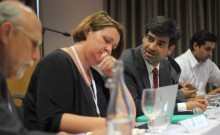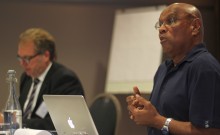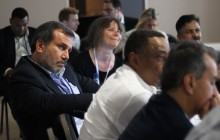Roundtable on Drivers of Regional Integration
Archive Economic Policy Forum

Photo: SAIIA
Following discussions earlier this year in Rio de Janeiro, EPF members met for their second roundtable on “Drivers of Regional Integration” in Cape Town, South Africa. The 2-day workshop was organized and hosted by EPF founding member, the South African Institute of International Affairs (SAIIA), supported by the EPF secretariat in Berlin at Deutsche Gesellschaft für Internationale Zusammenarbeit (GIZ) GmbH. The meeting was held in parallel and in parts jointly with a workshop of representatives from different Regional Economic Communities (RECs), and followed by exchange visits to the Cape Town Port Authority TRANSNET and the South African Revenue Service (SARS).
Renato Galvão Flôres Jr. from Fundação Getulio Vargas (FGV) initiated the workshop with a talk followed by lively interactions on the changing landscape of regional and international economic integration patterns by complex and fast-changing global value chains. Flôres’ illustrated why traditional forms and institutions for economic integration (such as FTAs, Customs Unions) are often no longer suited to shape and govern the current complex and highly volatile production, trade and investment patterns; he argued that any country and any economic actor today needs to find new, innovative approaches – and has to identify and tap into many new opportunities – to participate and profit from regional and global value chains.

Photo: SAIIA
Against this backdrop, the roundtable then discussed more specifically challenges of infrastructure development and finance in the Asian and South African context. The experts’ round generally found a great lack of regionally integrated and connecting infrastructure, both physical as well as soft. Lack of finance and investment seems to be a symptom rather than the cause of this problem, the reason being deep persisting political distrust and tensions that are hard to overcome. Furthermore, as Jaya Josie from the Human Science Research Council (HSRC) specifically pointed out for South Africa, the dilemma of having to try to maintain a comparative advantage as a provider of resources to the EU, China etc. – a vital source of income at least in the short-term – often restricts simultaneous efforts to build up new, regional value chains and comparative advantages in other sectors (manufacturing, services etc.). Esen Çağlar from the Economic Policy Research Foundation of Turkey (TEPAV), also highlighted that deeper regional economic integration is hard to come about as regional disparities may be deepened and thus constitute a challenge for integration efforts.
In a subsequent session, discussions revolved around current trade mega-deals such as TPP and TTIP and their repercussions particularly for emerging economies. Based on the presentation by Benedikt Heid from the University of Bayreuth (formerly IFO Institute Munich), of a stylized model that allows an approximation of economic gains and losses for these countries, the participants discussed in how far the mega-deals in question are in fact only political rhetoric, given very practical downsides even to the signatory economies. However, there was a common understanding that the BRICS as big regional emerging economies have a lot to gain from becoming more active in their own neighbourhoods, as regional integration agreements do undoubtedly bring greater prosperity and welfare, with market size and distance still being dominating factors. A BRICS initiative on common standards and norms would, furthermore, significantly facilitate trade amongst these big five.

Photo: SAIIA
The final two sessions of the roundtable focused on the corporate sector as well as specific investment strategies as drivers of integration processes. Pointing out specific examples and experiences from South Africa, Catherine Grant (Independent Associate of SAIIA), highlighted the dilemma of small and medium-sized entrepreneurs, who although often “romanticized” as economic drivers, are often still too insignificant to have any measurable impact in the generation of employment, growth or regional integrated value chains, and consequently have neither a lobby nor access to policy debates and processes, which in turn reinforces their marginal role. On the other hand, big multinationals as well as state-owned-enterprises are at the forefront of economic growth, employment and diplomacy, but follow hardly any given “strategy” – regional or other – and still operate in a rather uncompetitive environment in South Africa. Esen Çağlar shared a contrasting experience from Turkey, which through specific border investment zones as well as special business incentives is testing various ways of creating new space for the development of regional value chains, investment and business opportunities in a difficult geostrategic regional setting that affects economic opportunities.

Photo: SAIIA
At the end of two very interesting days of paper presentations and discussions, the roundtable participants agreed on conducting further joint Research and the following policy paper releases: 1) A comparative analysis of effects of regional and global trade deals, 2) A study on the development of intra-BRICS standards and norms, 3) Recommendations on increases intra-BRICS cooperation within the WTO, 4) Recommendations on the creation of transparent regional markets, 5) Recommendations on strengthening the development of financial markets within BRICS, 6) An analysis of the potentials for the creation of regional value chains in Latin America and Asia, 7) A comparative analysis of regional integration approaches from China, Russia, Nigeria, South Africa, India and Brazil.
Conference Papers
Regional Investment Strategies by Prof. Dr. Heribert Dieter
Conference Documents
List of Participants
Think Tank Profiles
Programme
Conference Report
EPF Cape Town Roundtable Report
Follow-up Meeting in Moscow
As a follow-up to the roundtable in Cape Town, members of the Economic Policy Forum (EPF) will meet in Moscow on 21 May 2015 to discuss and finalize the first round of publications on current challenges of regional economic integration and the creation of sustainable global value chains. More information:
EPF Seminar on Regional Integration and Value Chains at the BRICS Academic Forum 2015





